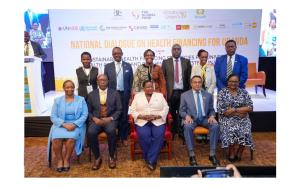WHO and partners back Uganda’s commitment to sustainable health financing for universal health coverage
As Uganda faces mounting challenges in financing its health sector amid declining donor support, the government is committed to ensuring that health is prioritized across all sectors. The Government of Uganda convened a three-day high-level national dialogue on health financing for Uganda convened in Kampala by the Ministry of Health, East African Community (EAC), World Health Organization (WHO), and other development partners.
The Prime Minister of the Republic of Uganda, Rt Hon Robinah Nabbanja noted that investing in health is not only a social imperative but also an economic one. "A healthy population is the backbone of national development. We have expanded access to primary, secondary, and tertiary healthcare services by improving infrastructure and human resources, ensuring the supply of essential medicines, and scaling up health promotion and disease prevention interventions such as immunization,” she said.
Under the theme “Sustainable Health Financing Strategies for Universal Health Coverage and Resilient Health Systems in Uganda,” the dialogue brought together over 300 participants, including government officials, parliamentarians, civil society, private sector representatives, development partners, and international experts. During the dialogue, one critical activity was assessing Uganda’s health financing landscape by participants and charting a path toward increased domestic resource mobilisation, efficiency, equity, and sustainability.
Uganda spends approximately US $ 57 per capita on health, below the WHO-recommended US $86 required to deliver essential health services. Out-of-pocket payments account for 28% of total health expenditure, and nearly half of Uganda’s health financing relies on donor support. With projections indicating a 25% reduction in external funding over the next five years, experts and policymakers alike stressed the urgency of adopting homegrown, sustainable solutions.
“The financing landscape is changing rapidly. We must now look inward and adopt reforms that ensure sustainable and dependable health financing,” stated Dr Daniel Kyabayinze, Director of Public Health at Ministry of Health, on behalf of the Minister of Health.
At the same time, the WHO Country Representative to Uganda, Dr Kasonde Mwinga, reaffirmed the organization’s longstanding support for Uganda’s health system, noting that, “sustainable health financing is the bedrock of our collective commitment to universal health coverage. We commend the government for the progress made and call for strategic actions to strengthen domestic financing, particularly through increased investment in primary health care and innovative financing mechanisms.”
Dr. Mwinga emphasized five key reform priorities the government should consider, including making efficiency and accountability non-negotiable, increasing the health budget allocation from 2% to 5% of GDP, and prioritizing investment in primary health care. Others are leveraging non-traditional financing sources like health taxes and institutionalizing equity to protect the most vulnerable. “WHO stands ready to support Uganda with technical expertise, global best practices, and regional collaboration to make these reforms a reality,” she concluded.
“As donor support continues to decline, there is an urgent need to prioritize domestic financing to reimagine and strengthen Uganda’s health system,” said Gift Malunga, UNFPA Uganda Representative and Chair of the Health Development Partners Group, speaking at the close of the two-day National Health Financing Dialogue.
Dr. Nandy Robin, UNICEF Country Representative in Uganda, emphasized that investing in primary health care and community health workers is essential to reducing inequities and ensuring no child is left behind. He stressed that domestic financing must match the urgency of the need.
Overall, the dialogue emphasized that sustainable health investments do more than save lives; they boost productivity, improve educational outcomes, and fuel broader economic growth through industrialization, tourism, and innovation. Yet, challenges persist, including low insurance coverage (less than 5%), inefficient resource allocation, and fragmented health systems, which continue to hinder progress.
At the end of the dialogue, the Government of Uganda launched a country position paper and a communique containing commitments on a comprehensive set of interventions to increase domestic resource mobilization, improve health financing efficiency, enhance equity and financial protection, and strengthen governance and financial accountability.
As Uganda moves forward, the message from the three-day engagement was clear: health financing reforms must be bold, inclusive, and country-led. The time to act is now as Uganda builds a financing system that is resilient to external shocks, responsive to the people's needs, and rooted in national ownership.
